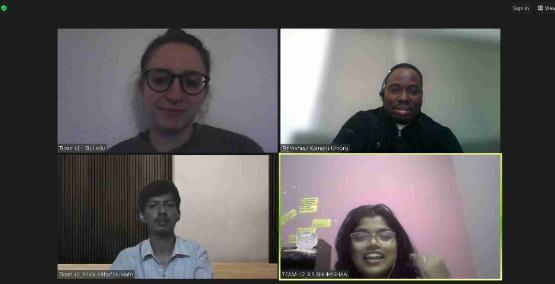Student part of winning team in climate action challenge

A University of Bradford student is celebrating after being part of a winning team in an international climate action project.
Emmanuel Umoru, who is studying MSc Applied Artificial Intelligence and Data Analytics, helped his team finish first at the World Technology Universities Network (WTUN) Climate Action Hackathon.
Challenged to address climate action concerns in just 48 hours, a total of 29 teams started the WTUN Hackathon which were whittled down to nine teams who advanced to the final. Then just six teams had the chance to pitch their solutions to a panel of judges. The competition was held virtually over the two successive days.

Emmanuel, pictured above, was joined on his four-person team, known as ‘Green Titans’, by representatives from the University of Applied Sciences Upper Austria and Hindustan Institute of Technology and Science in India.
‘Green Titans’ developed an app, called Earth Protector, which looked to reduce greenhouse gas emissions. Recognising that household consumption contributes to 72 per cent of global greenhouse gas, the team aimed to encourage individuals to monitor and reduce their carbon footprint through a user-friendly app.
Excellent Experience
The team produced a prototype within 24 hours of the start of the Hackathon which included a steps tracker and barcode scanner for tracking recyclable products.
They received help and advice on their project from mentors and attended masterclasses. The team presented a five-minute pitch to a panel of judges which included how their app could help with the reduction of greenhouse gas emissions.
Emmanuel said: “Being a member of the team that participated in the Hackathon was an excellent experience.
“It was a wonderfully great experience to work with my talented peers and contribute to the development of solutions that were innovative for climate action. This is a moment that I am proud of, not only for myself but also for the entire team and for our university.
“Being part of this Hackathon has been a valuable addition to my academic journey, providing practical experience and insights into the real-world problem solving and brainstorming in addressing global challenges.
“I wouldn’t have heard about the WTUN Hackathon if I wasn’t studying at the University of Bradford. The University of Bradford is one of the member universities of WTUN.”

Dr Kamran Mahroof, Associate Professor of Supply Chain Analytics and Programme Leader for the MSc in the Applied Artificial Intelligence and Data Analytics programme, at the University of Bradford, School of Management, said: “The WTUN is an excellent forum for purpose driven collaboration, and the recent Hackathon event is an example of how likeminded students can come together to ideate and find innovative ways to deliver social value through cutting-edge tech.
“Very pleased to see our MSc Applied AI student, Emmanuel, being part of the winning team, further reflecting how our courses equip students with leading AI skills and developing them as future impact makers.”
Real Climate Challenges
Meanwhile, Charles Ogun, who is studying a MSc in Finance and Investment at the University of Bradford, was part of a four-person team that finished second in the Hackathon.
His team, known as The Cracker, devised a service to be used by locations including restaurants to sustainably manage organic waste.
One of the Hackathon’s judges, Professor David Spicer, Director of Business and Community Engagement at the University of Bradford, said: “It was great to see the commitment and engagement from the teams over the 48 hours and the brilliant ideas that came through to the final.
There were some great innovative responses to some real climate challenges and some interesting business ideas to address these
There was further University of Bradford representation at the Hackathon from Professor Vadim Grinevich, Professor of Entrepreneurship and Small Business Innovation in the university’s School of Management, who was a mentor to the participants.
Speakers at the Hackathon included Paul Thorning, Professor of Innovation and Entrepreneurship Practice and Director of Open Innovation in the University of Bradford School of Management, and Dr Suzanne Smit, also from the university’s School of Management. Professor Shirley Congdon, Chair WTUN and Vice-Chancellor, University of Bradford, also participated in the Hackathon’s pre-event.
WTUN was founded in 2016 by former University of Bradford Vice-Chancellor Professor Brian Cantor, with the aim of making university research more accessible and more relevant. WTUN has 19 members, including higher education institutions in Australia, India and Malaysia.
